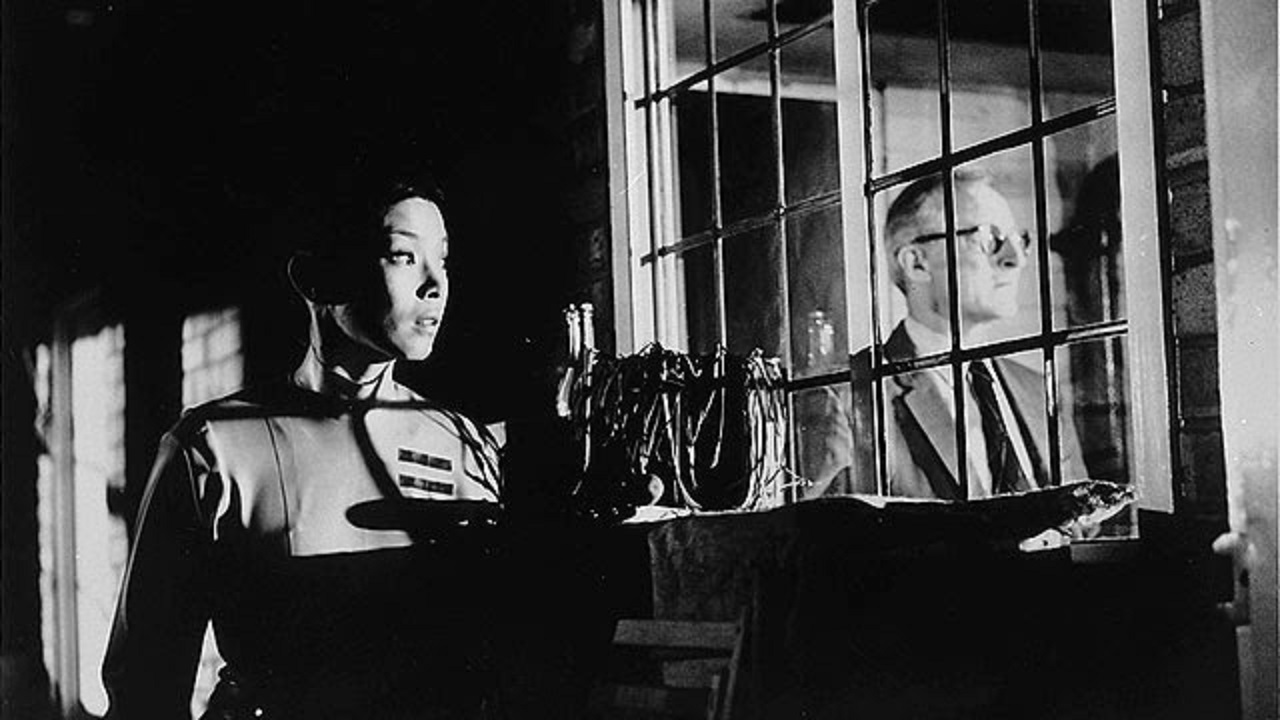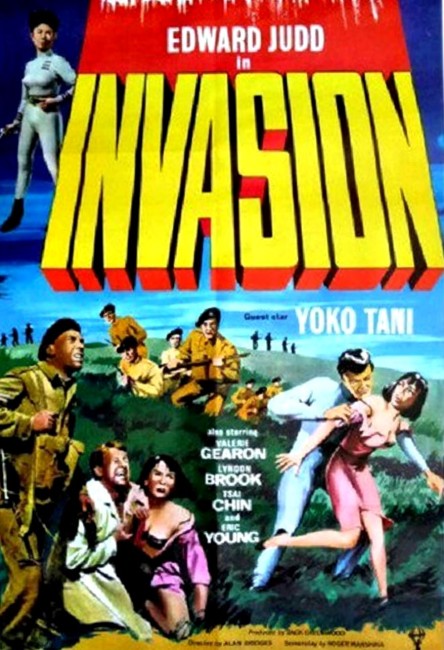Crew
Director – Alan Bridges, Screenplay – Roger Marshall, Story – Robert Holmes, Producer – Jack Greenwood, Photography (b&w) – James Wilson, Music – Bernard Ebbinghouse, Special Effects – Jack Kine, Stan Shields & Ronnie Whitehouse, Makeup – Benny Royston, Art Direction – Scott MacGregor. Production Company – Merton Park Productions
Cast
Edward Judd (Dr Mike Vernon), Yoko Tani (Leader of the Lystrians), Valerie Gearon (Dr Claire Harland), Lyndon Brock (Carter), Eric Young (The Lystrian), Tsai Chin (Nurse Lim), Barrie Ingham (Major Muncaster), Anthony Sharp (Blackburn), Jean Lodge (Barbara Gough), Ann Castle (Sister Evans), Glyn Houston (Sergeant Draycott), Leonard Cracknell (Lloyd)
Plot
In a small English country town, Blackburn is driving home with a woman who is not his wife when a man appears out of the fog in front of him and collides with the car. Blackburn rushes the mystery man to the local hospital. There doctors Mike Vernon and Claire Harland are puzzled because the man’s blood does not appear to be human. The man recovers and after touching the face of a nurse is able to speak English. He explains that he comes from the planet Lystria but crashed on Earth where two women he was holding prisoner made an escape. A forcefield goes up around the hospital and the temperature inside starts to become very warm as it rises to a level that the Lystrians are used to. Mike is not sure whether to believe the man’s story or whether the man is a criminal who was really being held prisoner by the two women.
Invasion is a minor and generally overlooked entry in the British alien invader fad of the 1950s/60s. The British alien invasion genre, always an attempt to copy the more successful American counterparts, is largely dominated by works like The Quatermass Xperiment/The Creeping Unknown (1955), Quatermass 2/The Enemy from Space (1957) and Village of the Damned (1960), although did produce a number of other less-well-known efforts such as Devil Girl from Mars (1954), Stranger from Venus/Immediate Disaster (1954), X the Unknown (1956), Fiend Without a Face (1958), The Trollenberg Terror/The Crawling Eye (1958), Unearthly Stranger (1963), The Earth Dies Screaming (1964), The Night Caller (1965), Night of the Big Heat (1967), They Came from Beyond Space (1967) and The Body Stealers (1969). Invasion screenwriter Robert Holmes went onto write a number of classic episodes for tv’s Doctor Who (1963-2009, 2005– ), the show that became the most celebrated teller of alien invasion tales in England during this era, during its 1970s heyday. (For a more detailed overview see Alien Invasion Films).
Invasion is a modest, although never entirely a standout effort. However, it does touch on some of the atmosphere that some of its better American counterparts – the likes of Invaders from Mars (1953), It Came from Outer Space (1953), Invasion of the Body Snatchers (1956) – did. There is a fine opening in which director Alan Bridges lets everything take place amid the everyday – a radar operator lazily reading a copy of G-String Tales; Edward Judd’s doctor dealing with a drunken nuisance patient; middle-aged Anthony Sharp driving home with a woman (Jean Lodge) who is not his wife when the alien steps out of the fog and is hit by his car. These scenes do a fine job in creating a sense of ordinariness among the various characters, something that the American alien invasion films never much concerned themselves with. Later Bridges builds a modest atmosphere of alienness out of the fog.

On the other hand, after a worthwhile set-up, nothing much happens. The story becomes slow moving and somewhat uneventful. There are various happenings around the hospital as they try to puzzle over the nature of the alien and then debate whether to believe his story, but this is mostly talk rather than atmosphere. Things are pumped up sporadically with the appearance of the forcefield and a scene where Lyndon Brock’s car explodes as he tries to drive away, as well as Edward Judd’s venture down into the sewers.
The film’s major distinction of Invasion is that it builds on the same reversal of expectation about what at the outset appear to be sinisterly invading aliens that we had in It Came from Outer Space to create the first alien cops-and-robbers film. This is a theme that became popular in the late 80s/early 90s in the likes of The Hidden (1987), the tv mini-series Something is Out There (1988), Peacemaker (1990), Abraxas: Guardian of the Universe (1992) and Monolith (1994). Invasion is also commendable for adding a mix of ethnic (Asian) faces to the cast line-up, well before such became commonplace in US films.
Director Alan Bridges mostly worked in British tv and made several feature films, most famously the excellent Edwardian drama The Shooting Party (1986). His only other work in genre material was the original film version of the Stephen King novella Apt Pupil (1998), which ended up being shut down in mid-production before later being revived by Bryan Singer.


